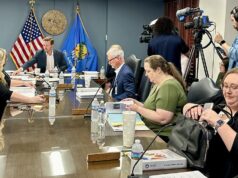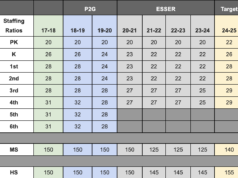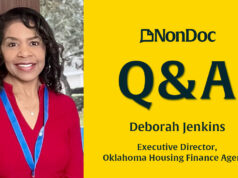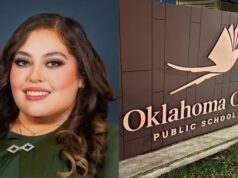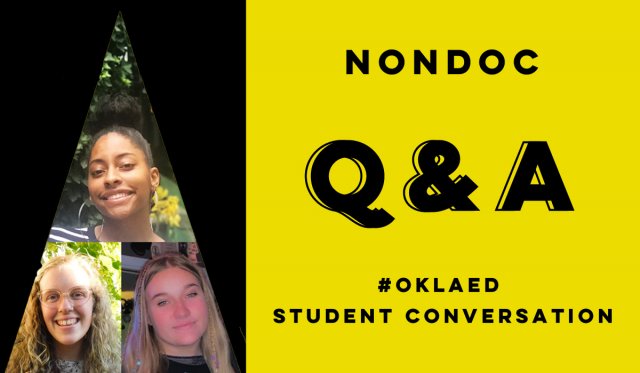

When examining how the COVID-19 pandemic has altered Oklahoma education, we often ask medical experts and school officials to provide a picture of what is and should be happening with students.
But students have their own insights on exactly how much things have changed and how these changes have affected them.
In the following Q&A, Yukon High School senior Arysa Puckett, Marlow High School senior Harper Pitts and Harding Charter Preparatory High School senior and Metro Technology Center student Akwe Trevillion discuss what has been different, what could be better and how their future plans have changed.
Responses have been edited lightly for length, clarity and style.
1) What were your expectations going into the school year?
Arysa Puckett, Yukon: This year we started off online (distance learning) and I wasn’t expecting too much because I was honestly a little hopeless at that point. I didn’t see it getting a lot better, so I was expecting to be bored in school and bored online. I wasn’t very hopeful that we would be able to return in school very soon.”
Harper Pitts, Marlow: I was expecting not to have in-person school at all, and I have been proven wrong. Our school has only been virtual for one week over Thanksgiving. Aside from that, I was expecting not to get a senior year at all. Since we’re a pretty small school, it’s a lot easier to regulate that. I wasn’t expecting to travel for sports or anything. And some of that stuff, just in hindsight, probably wasn’t the best idea. Our school has been running almost normally.
Akwe Trevillion, Harding (OKC): “I still go in person to Metro Tech, and I have for most of the year. For regular school, I thought it was going to be a little more organized, but we started out on a bunch of different education platforms, and we mostly ended up on Microsoft Teams. I thought they were going to have it a little more together, but it’s online school. I didn’t expect it to be amazing. I think it’s working out pretty well.”
2) How has the pandemic changed how you learn? What hurdles have you faced?
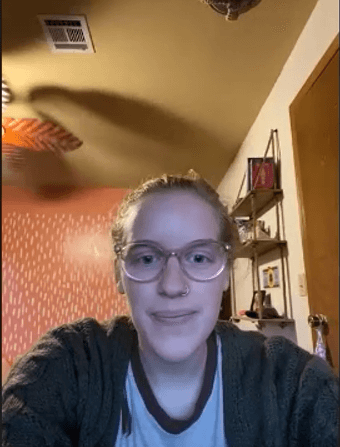
Puckett: We’ve gone online, then we went back in person for a brief time. Then we went back online after Thanksgiving break, and now we’re back in person. So, it’s been a rollercoaster. I feel like we’re finally getting somewhere, then we’re back in the red zone.
It’s been a struggle to feel like I’m actually learning something. Every time I feel like I finally understand a concept, we get moved back online. It’s a lot more distracting to be online. There’s no accountability, really. I definitely try to use things like Khan Academy and AP College Board because they put out a lot of good videos. When I am in person, I try to take advantage of that situation because you really don’t know how long it’s going to last.
Pitts: For a while in the first semester, we did virtual days once every month. We would practice what it would be like if we had to go fully virtual. So, there’s definitely been a lot more anxiety being in person the whole time with having that constant fear of, “Are we going to go virtual?”
Trevillion: I had piano for some reason… I asked to be put in trig for an extra math class because I was thinking about going international for college, and they want to see four years of everything. It was the worst mistake of my life. Trig is so hard, I never want to see it ever again.
The teacher is a good teacher, and I understand what he’s saying and what he’s trying to teach us to do, but after I watch the video it all kind of goes away and I have to stare at a blank paper for a little bit and try to figure it out along the way. That personally was really difficult for me. Could you imagine having chemistry right now? It’s been OK for me, but for everyone else this is something that could use a little more structure. A lot of kids are having to teach themselves the materials and videos only do so much.
3) How has the pandemic changed how you socialize and participate in extracurricular activities?
Puckett: It’s a little weird. In choir, normally you’re all packed on risers, and you’re very close to the person next to you. Now we all wear masks and we’re six feet apart. It’s very different, but my choir director tries to focus on activities that help us with branching out and talking to people you might not have.
I try to tell myself not to be afraid to talk to other people at school. Not that I normally am, but sometimes you’re self-conscious to talk to strangers in your class. You don’t know how long it’s going to last. It’s better to make a friendship while you’re in school.
Pitts: I’m pretty involved, I’d say. I’m in Student Council, FCCLA, I managed football, basketball and baseball, and I’m in band. With all of those, there’s something different we have to do with every single one since we’re all in person. It’s masks always. I wear two because of Dr. (Anthony) Fauci’s recent observation. We have assigned seats constantly. It’s really structural now, so we can do contact tracing better.
I do notice a lot of people don’t wear masks when they’re going to lunch. It kind of feels like we social distance constantly in our school, but we don’t really care when we have breaks that affect our social lives. It’s kind of frustrating just seeing that. I know it’s frustrating for me to still be going out and stuff, but I still try to be safe, and I still have that guilt. I’m constantly anxious, and I see my friends or my peers not caring, and that’s really affected my social life. I really noticed my friendships and some of the people I’ve drifted apart from because I’ve seen how unsafe they’re being.
Trevillion: Before the second semester there was nothing extra curricular going on in the school. Schoolwise, it hasn’t been very taxing, but friendwise I am in a couple of other extracurriculars. Like Jack and Jill of America, I’m the teen president. I’m sure to be very careful about what I do. I maybe go hang out with someone once a month, and that someone is my friend who lives down the street.
4) What are your biggest concerns surrounding the pandemic?
Puckett: I’m a young person, and obviously the trend is that young people won’t catch it as severely. My concern has really been spreading it to my grandparents or parents because they’re a lot older. Going back to school has also been a little bit scary because the hallways are so packed. We’re all wearing masks, but obviously not everyone wears them correctly. You can’t hold every kid accountable — there’s just too many of us.
Pitts: My biggest concern really is college. I’m nervous about large groupings and things of that nature and people not necessarily taking proper precautions. However, with the vaccine coming out, hopefully that will do something.
Akwe: Like I said earlier, I was thinking about going internationally (…) but it’s also scary because I wouldn’t have very many people that I know around me. I’m in Metro Tech and I’m studying cosmetology, and that’s a profession where you have to be in contact with people all the time. It’s like, do I need to postpone following that careerwise and re-evaluate what I’m going to do? Hopefully it will get better by the summer, but that’s what we said last year and look at us now.
5) What are your plans after high school graduation? Has COVID changed those plans?
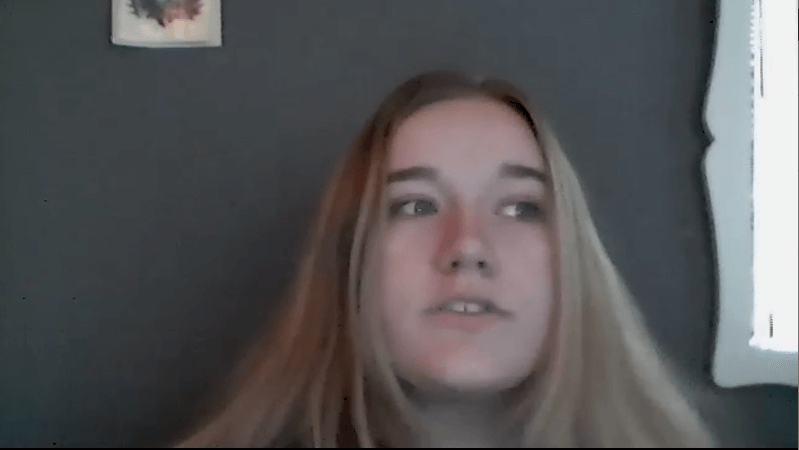
Puckett: I’ve discovered a love for environmental science, and that’s actually what I’m going to be majoring in. I plan on going to Colorado State University. The biggest obstacle was getting into an ACT slot because I knew that was something I wanted to do. Like a lot of people, COVID has made me focus on what I want to do in my life. I told myself I wasn’t going to limit myself to staying in state where I’m comfortable. Staying inside has also forced me to see that I’m a restless person and I don’t like doing this. I want to be able to go explore and go be curious.
Pitts: I did get accepted into OSU, and I was looking how they were handling the pandemic and that made me swiftly change my mind. I’m now attending the University of Central Oklahoma in the fall. I switched my major to political science, which I think is more fitting for me.
For a while, I wanted to be an education major to be a history teacher. Socially, I realized I’m a woman, and that’s going to be hard to do especially if I stay in the state of Oklahoma. I also realized that education is a career where you’re in contact with people constantly. I’m also worried about reforms in education and how that career might not be necessarily the same as it is, or if I go to college for four years and everything changes.
Akwe: My sophomore year I went to Germany on a school trip and I loved it, and I was like, “Why not do that for college?” I decided this over the summer with everything going on, all of the protests. I know people deal with this in other countries, but getting out of here seems so amazing.
I just started getting kind of nervous about everything. I had even applied to the Freie Universitat of Berlin. I didn’t have all the stuff they want to see, like some other AP credits, so I would have to wait until the end of my senior semester to re-apply. I feel a bunch of different ways about college. I kind of feel like it’s a little bit of a scam. Trade school seems like the best option right now. I don’t know if I still want to go to college or further education, but for at least a year, I might take kind of a gap year.
6) What could your school be doing differently regarding the pandemic?
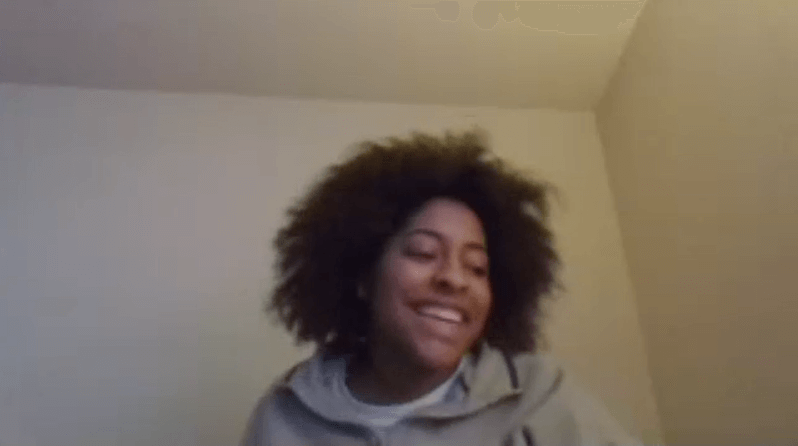
Puckett: One thing I’ve heard from a lot of students is that there’s no instruction given to students who are having to quarantine. The assignments are just being pushed out and they’re expected to do them without a lot of instruction. Every teacher at our school has a computer, so I feel like it would be really simple to record one of their classes and put it out on the website. It’s really unfair to students who have to quarantine to not have instruction for two weeks.
Pitts: Something I do wish the school would do is push kids to wear masks outside of school or during break times. Going to a rural school, it definitely has more conservative ideals in the sense of the pandemic. A lot of stuff is treating it as a hoax sometimes, and I wish they would do proper education as to what is happening.
Akwe: I would say communication could be a lot better across the board. For me, mostly my teachers answer pretty quickly, but I feel like the school administration is a million miles away sometimes. Maybe there could be a few more inter-school activities going on so we still have a school community waiting for us. Sometimes that gets lost in very dry emails.
7) What advice do you have for current students and teachers?
Puckett: I would tell them although being in the present is necessary, it’s also a really important to look toward the future. This isn’t going to last forever. We will get out of this. I know it seems like an eternity since you’ve been able to go to a concert or be around more than 10 people at a time, but we will get out of this. Just be patient. To any teachers being too harsh, take a step in our shoes — a lot of us are trying our best.
Pitts: Thank you for your patience. It’s confusing for us, and it’s definitely a difficult time for us to live in, being young and having our entire world crumble on us. Don’t give up hope yet.
Akwe: It’s more about what you make of your year rather than what you’re missing. You have to be a little bit more creative about how you look at things. Adapt accordingly. It’s not worth putting yourself at risk.









